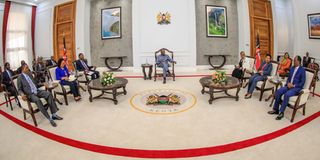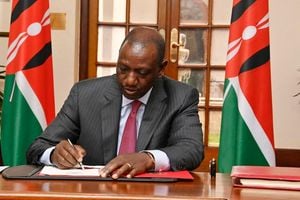
President William Ruto when he met Chief Justice Martha Koome and National Assembly Speaker Moses Wetang’ula.
Kenya’s economic growth prospects remain modest to poor. And the recent “truce” or “peace” between the three arms of state will only dim those prospects. It enhances the executive’s dominance over the other arms, narrowing the possibilities of stemming economic mismanagement. Here is how.
Kenya’s governance structure, as framed in the Constitution consists of Checks and Balances. The Legislatures make law, but the Executive has to sign it. A two thirds majority overcomes that veto. Courts can strike the law down if it offends the Constitution. Legislatures oversight the Executives at both levels of government. To give this oversight teeth, Legislatures can impeach the Executives. This power has not been exercised in respect of a president, but it has been tested severally on governors.
A frequent charge is the contravention of the Public Finance Management Act. At the national level, contravention of the principles of public finance has disastrous consequences for the economy.
To balance and taper what the assemblies do, the impeachment is a two-stage process. The accusations are tabled in the relevant assembly. The Executive must be given ample opportunity to defend themselves. If the assembly votes not to impeach, that is the end of the matter. If they vote to impeach, the matter proceeds to the Senate.
The Senate may agree, or not, with the assembly. On several impeachment attempts, the Senate has disagreed with the Assemblies, finding that the cases were not convincing. The Meru case is the most recent.
The impeachment power is also subject to judicial review. If it does not follow the law, it can be struck down. This creates a Balance of power. Such was the case in Embu.
But she who pays the piper calls the tune. After the meeting of the three arms of state this week, one newspaper run a story that the Chief Justice had gone to State House with a begging bowl. Reportedly, the national Executive agreed to “give” the Judiciary more money to hire additional judicial officers. This is odd, since the Judiciary fund is a charge on the consolidated fund.
A charge on the consolidated fund is not subject to an appropriation, the Constitution directs at article 221. That is to say, the national Executive has no role in the matter. This fact has been routinely ignored and has prompted the argument that debt service has been illegal, since it is not contained in an appropriation act. I disagree. The language of 221(7) is direct and unambiguous.
But if all the arms of the state dip into the consolidated fund at will, where is the moderation? The Constitution gave that power to the National Assembly. It is the Assembly that pulls together the budget. Article 221(3) lays out the process. The National Assembly shall consider the estimates of expenditure of the national government laid before it by the Cabinet Secretary for the Treasury, together with the estimates of expenditures “submitted by the Parliamentary Service Commission and the Chief Registrar of the Judiciary under articles 127 and 173 respectively”.
The expenditure estimates of these two arms of state are independent of the national Executive. When the Judiciary needs more money, it is the Parliamentary Leaders they should negotiate with, and not the Executive.
221(7) frees both Parliament and Judiciary from the piper problem. The Appropriation Bill “shall not include expenditures that are charged on the consolidated fund by this Constitution or an Act of Parliament”. But to exercise that freedom herself, the National Assembly needs to amend the Public Finance Management (PFM) Act. PFM Act (24) establishes the Parliamentary Fund, but fails to charge it. That is on the Assembly.
But the Judiciary is freed in total. The Constitution establishes the Judiciary Fund at article 173(1). And once the expenditure estimates are approved by the National Assembly, they are a charge on the consolidated fund as directed by article 173(4).
The current practice, however is for the arms of state forward their budgetary “proposals” to the national Treasury. And disbursements happen at the convenience of the Treasury. I think that the Controller of Budget, relying on the Constitution, should approve charged withdrawals from the consolidated fund without waiting for administrative action from the Treasury. She disagrees.
If she did, it would break the national Executive’s stranglehold of the consolidated fund. It is this grabbed power that enables the national Executive to arm twist the other arms. It defeats the essence of Checks and Balances. It tilts the power balance in favour of the national Executive. This enables the national Executive to grow their expenditure as they wish. The uncontrolled growth of expenditures creates high fiscal deficits year after year, pushing debt service and interest rates up.
The nearly one billion USD from IMF has calmed financial markets, somewhat. The loan brings much needed relief, as the bullet payment of the two billion USD Eurobond draws near. Treasury mandarins favour a sinking fund to bullet payments, but successive regimes have voted the idea.
This borrowing would not have been necessary if the regime was not increasing their expenditure by nearly 500 billion shillings each year. As a result, they have to tax and borrow more. Since taking office, the regime has increased the stock of public debt by over one trillion shillings.
The courts sought to moderate the excessive taxes, striking down those, like the housing levy, that are in breach of the Constitution. The Executive responded by launching a concerted attack. The Judiciary called for a truce. The Executive sweetened the deal by “allowing” more resources to hire additional judicial officers.
This sets the stage for this year’s finance act. It will create 382 billion shillings of new taxes, including on farm produce, dimming growth prospects. With both Parliament and the Judiciary unable, or unwilling, to stand up to the Executive, the citizen is on her own.
@NdirituMuriithi is an economist







